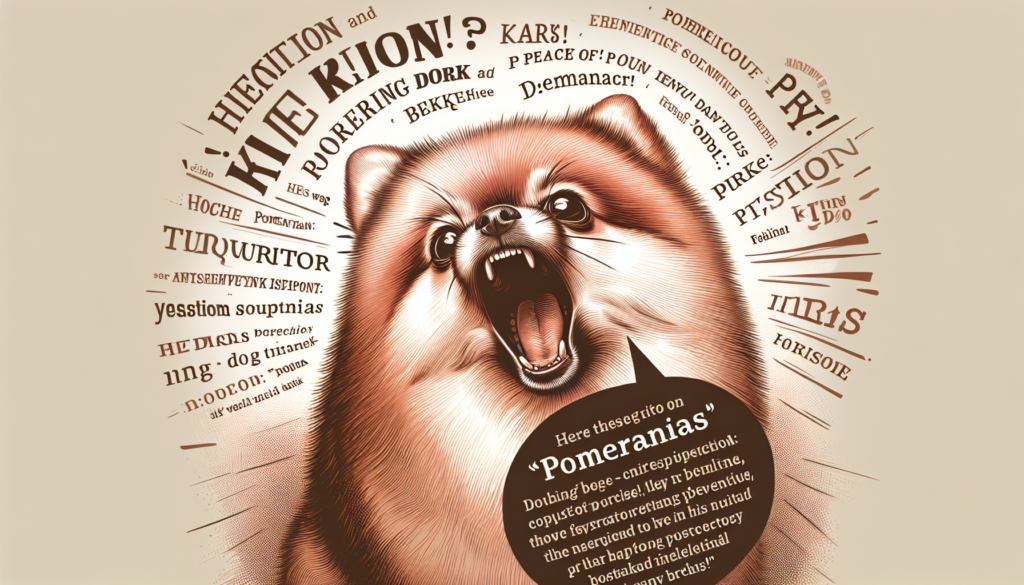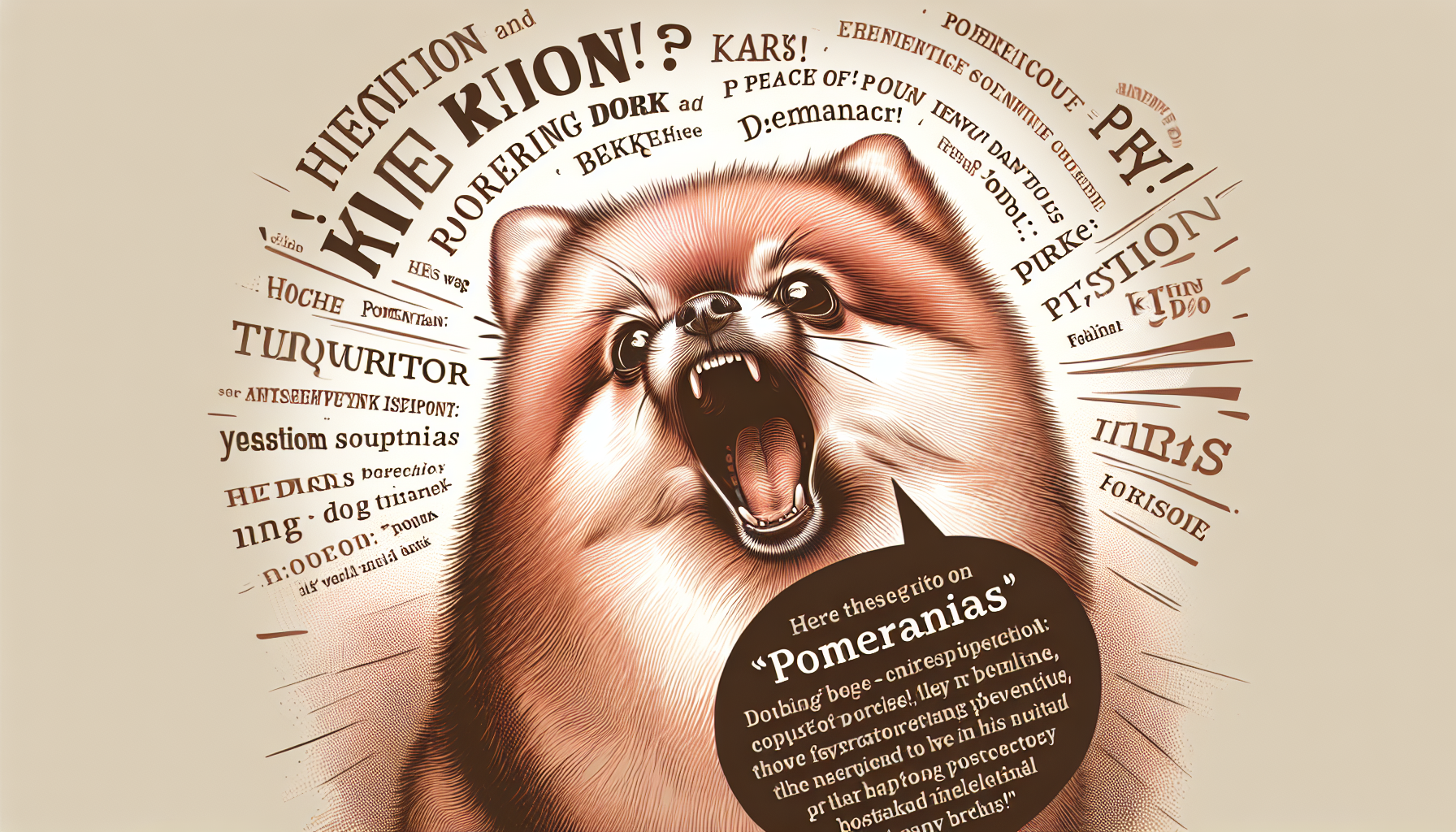If you’re considering getting a Pomeranian as your new furry friend, you may have heard some rumors about their excessive barking. However, before you make any assumptions, it’s important to gather the facts. Pomeranians, like any other dog breed, have unique characteristics and tendencies. In this article, we’ll explore whether Pomeranians are indeed known for their barking habits and provide you with a well-rounded understanding of this adorable and lively breed. So, let’s dig in and discover if Pomeranians truly live up to their reputation as vocal canines!
Are Pomeranians Known for Barking Excessively?
Pomeranians: An Introduction
Pomeranians are popular small dog breeds known for their abundant coat, vibrant personalities, and, sometimes, excessive barking. Let’s dive into the origin, characteristics, and breed standard of Pomeranians.
Understanding Excessive Barking
Excessive barking refers to persistent and unwarranted vocalization beyond what is considered normal for a Pomeranian. To address this behavior, it is important to understand the reasons behind it and the impact it can have on Pomeranians.
Factors that Influence Barking Behavior
Several factors can contribute to excessive barking in Pomeranians. Understanding these factors can help identify the root cause and develop effective strategies to manage and reduce the barking behavior.
Pomeranians: An Introduction
Pomeranians originated from the Pomerania region, which is now part of Poland and Germany. They are descendants of large sled dogs and were bred down in size to become the small and playful companions we know today. Pomeranians gained popularity as pets during the 18th century and have remained beloved companions ever since.
Pomeranians are known for their small size, weighing between 3 to 7 pounds, and their distinctive double coat, which requires regular grooming. They have a lively and extroverted personality, often displaying great confidence and fearlessness despite their small stature. Pomeranians are also intelligent, alert, and highly trainable.
The breed standard for Pomeranians includes certain desirable physical attributes, such as a fox-like head, almond-shaped dark eyes, and a plume-like tail that arches over the back. Additionally, their coat can come in a variety of colors, including orange, black, white, cream, sable, and more.
Understanding Excessive Barking
Excessive barking can be defined as continuous, loud, and often unnecessary vocalization that goes beyond a Pomeranian’s normal communication. It is important to recognize that excessive barking is a behavior that can be caused by various factors and should not be seen as inherent to the Pomeranian breed.
There are several reasons why a Pomeranian may engage in excessive barking. It could be due to their temperament and natural instincts, health conditions or pain, lack of mental and physical stimulation, fear, anxiety, and insecurity, environmental triggers and noise sensitivity, or a lack of training and socialization.
Excessive barking can have adverse effects on Pomeranians, including increased stress levels, irritability, and even physical health problems. It can also strain the relationship between the dog and their owner, as the constant noise can be disruptive and frustrating.
Factors that Influence Barking Behavior
Several factors can influence a Pomeranian’s barking behavior. Understanding these factors can help identify the underlying causes and develop appropriate strategies to manage and reduce excessive barking.
A Pomeranian’s temperament and natural instincts play a significant role in their barking behavior. They are alert and protective, which can lead to alarm barking when they perceive a threat. Additionally, their high energy levels can contribute to excessive barking if not properly exercised and stimulated.
Health conditions and pain can also cause a Pomeranian to bark excessively. It is essential to monitor their health regularly and address any underlying medical issues that may be contributing to their barking behavior.
Lack of mental and physical stimulation can result in boredom and frustration, leading to excessive barking. Pomeranians require regular exercise, interactive playtime, and mental enrichment activities to lead a balanced and contented life.
Fear, anxiety, and insecurity can trigger excessive barking in Pomeranians. It is crucial to provide a safe and secure environment for them, address any fears or anxieties they may have, and ensure they receive proper socialization and positive reinforcement training.
Environmental triggers, such as loud noises or other dogs barking, can also elicit excessive barking in Pomeranians. Their heightened sensitivity to sounds can make them more prone to react with barking, and it is important to manage their exposure to such triggers.
Lack of training and socialization can contribute to excessive barking. Proper training techniques and socialization from an early age can help Pomeranians develop good behavioral habits and learn appropriate ways to communicate their needs.
Tips to Manage and Reduce Excessive Barking
When faced with a Pomeranian barking excessively, there are several tips and techniques that can be implemented to manage and reduce the behavior. Consider the following strategies:
- Consulting a veterinarian or professional trainer: Seeking professional guidance can provide valuable insights into the underlying causes of a Pomeranian’s excessive barking and help develop a customized training plan.
- Implementing consistent training techniques: Using positive reinforcement methods, teach your Pomeranian the “quiet” or “enough” command to signal them to stop barking. Consistency is key to effective training.
- Providing mental and physical stimulation: Engage your Pomeranian in regular exercise, interactive playtime, and provide mentally stimulating toys to keep them occupied and prevent boredom-induced barking.
- Addressing health concerns: Regular veterinary check-ups are essential to ensure your Pomeranian is free of any underlying health issues that may contribute to their excessive barking.
- Creating a calm and safe environment: Minimize environmental triggers, create a designated space for your Pomeranian where they can feel secure and calm, and use white noise or soothing music to drown out external noises.
- Socializing Pomeranians from an early age: Exposing your Pomeranian to different people, animals, and environments in a positive and controlled manner can reduce anxiety and fear, leading to less barking.
- Using positive reinforcement: Reward your Pomeranian with treats, praise, and affection when they exhibit appropriate behavior and remain calm during potential barking triggers.
- Avoiding punishment-based training methods: Harsh punishments or yelling can exacerbate anxiety and fear, leading to more excessive barking. Positive reinforcement is a more effective and humane approach.
- Using desensitization and counterconditioning: Gradually exposing your Pomeranian to triggers that usually cause excessive barking while rewarding calm behavior can help them associate these situations with positivity.
- Considering alternative solutions: In severe cases where excessive barking persists despite training efforts, alternative solutions such as anti-bark collars or seeking professional help may be considered.

Exercising and Engaging Pomeranians Properly
Understanding the exercise needs of Pomeranians is crucial for their overall well-being and to prevent or reduce excessive barking. Despite their small size, Pomeranians are energetic and require regular physical and mental stimulation.
Pomeranians benefit from daily exercise, but their exercise needs are relatively moderate. Short walks, play sessions in a securely enclosed area, and interactive games can help fulfill their exercise requirements. It is important to consider their age, health, and physical capabilities when planning exercise sessions.
In addition to physical exercise, mental stimulation is equally essential for Pomeranians. Engage them in interactive toys, puzzle feeders, and training sessions that challenge their intelligence and keep their minds active. Mental enrichment activities can help prevent boredom and subsequently reduce excessive barking.
Scheduled playtime with your Pomeranian is an excellent way to bond with them and provide both physical and mental stimulation. Incorporating obedience training, retrieving games, or even agility exercises can keep them mentally and physically engaged while strengthening your relationship.
Training Techniques for Barking Control
effective training techniques can help control and reduce excessive barking in Pomeranians. By utilizing positive reinforcement methods and redirecting their attention, you can encourage desired behavior. Consider the following strategies:
- Teaching the “quiet” or “enough” command: Through consistent training sessions, teach your Pomeranian to associate a specific command with ceasing their barking. Reward them when they respond appropriately.
- Positive reinforcement training methods: Reward your Pomeranian with treats, praises, and affection when they remain calm and refrain from excessive barking. Positive reinforcement encourages them to repeat the desired behavior.
- Redirecting attention and distraction techniques: When your Pomeranian starts barking excessively, redirect their focus by offering a toy, engaging them in a game, or giving them a command that requires their attention.
- Creating a safe and comfortable “quiet” space: Provide your Pomeranian with a designated space where they feel secure and can retreat when feeling anxious or overwhelmed. Include their bed, toys, and calming items to promote relaxation.

Common Mistakes to Avoid
To effectively address excessive barking in Pomeranians, it is essential to avoid common mistakes that can unintentionally reinforce the behavior. By understanding what not to do, you can create an environment conducive to reducing excessive barking. Avoid the following:
- Ignoring or encouraging excessive barking: Ignoring excessive barking can inadvertently reward the behavior, as the dog may perceive it as getting attention or achieving their desired outcome. Similarly, actively encouraging barking can reinforce and escalate the behavior.
- Using punitive actions or harsh training methods: Punitive actions, such as yelling, hitting, or using shock collars, can instill fear and anxiety in your Pomeranian, potentially exacerbating their excessive barking.
- Neglecting mental and physical stimulation: Boredom and lack of mental or physical stimulation can contribute to excessive barking. Failing to provide adequate exercise and mental enrichment can lead to undesirable behavior.
- Lack of consistency in training: Inconsistency in training can confuse your Pomeranian and undermine your efforts to reduce excessive barking. It is important to establish consistent rules and boundaries and apply them consistently.
- Failing to address underlying health issues: If excessive barking persists despite training and environmental adjustments, it is crucial to consult a veterinarian to rule out any underlying health conditions that may be contributing to the behavior.
Pomeranians and Separation Anxiety
Separation anxiety is a common issue among Pomeranians. They form strong bonds with their owners and can become highly distressed when left alone. Understanding and addressing separation anxiety is crucial for managing excessive barking in these situations.
Separation anxiety in Pomeranians is characterized by behaviors such as excessive barking, destructive chewing, house soiling, and attempts to escape. These behaviors occur when the dog is separated from their owner or left alone for extended periods.
To prevent and manage separation anxiety, it is important to gradually acclimate your Pomeranian to being alone. Start with short periods of separation and gradually increase the duration over time. Providing stimulating toys, leaving comforting scents, and using background noise can also help alleviate anxiety.
In severe cases of separation anxiety where excessive barking persists despite efforts to manage it, it is advisable to seek professional help. A qualified animal behaviorist or veterinarian can provide guidance and develop a customized treatment plan to address the underlying anxiety.
Conclusion
While Pomeranians are not inherently known for excessive barking, it is a behavior that can be encountered in some individuals. Understanding the factors that contribute to excessive barking and implementing appropriate management and training techniques can help promote a healthy barking balance for your Pomeranian.
Remember, educating yourself about Pomeranian behavior, providing a loving and enriched home environment, and seeking professional guidance when needed are essential in ensuring the overall well-being and happiness of your beloved Pomeranian companion.
